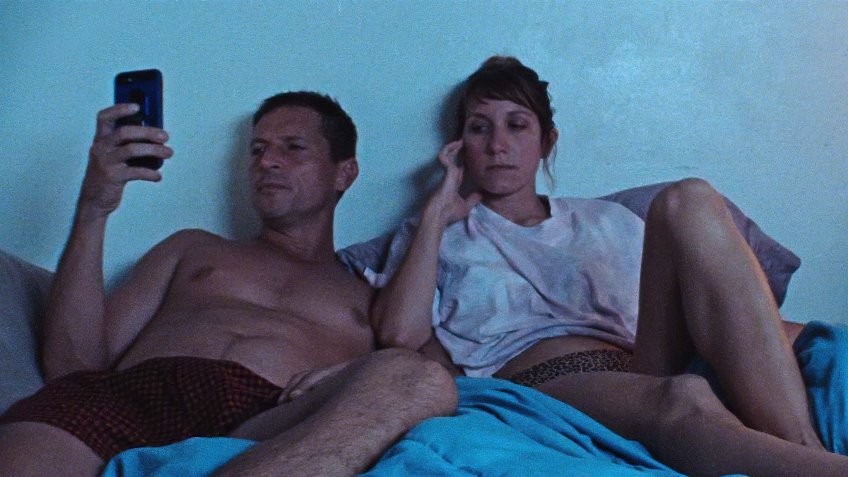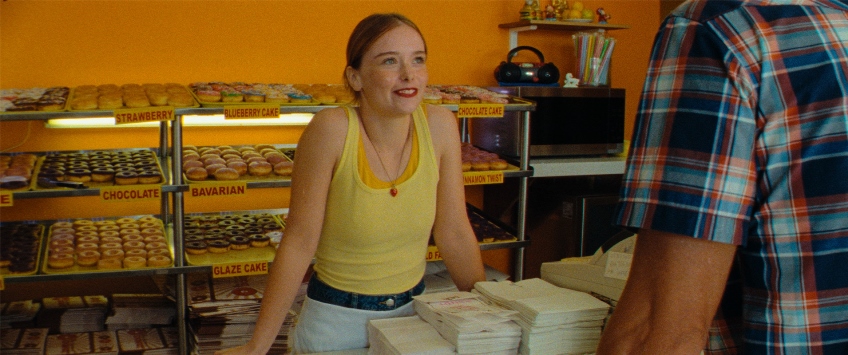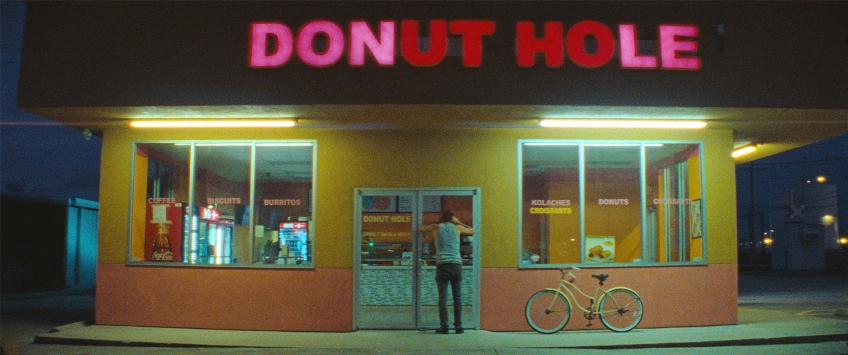Joyce Glasser reviews Red Rocket (March 11, 2022) Cert 18, 131 mins.
The best films, like the best novels, are remembered for their characters and their sense of place, which might be why so many films are now adapted from novels. The original screenplay category is not an endangered species, however, thanks in part to American co-writer-director Sean Baker and writer Chris Bergoch, whose last three films, Starlet, Tangerine, and The Florida Project, catapulted them into the limelight (with an Oscar nomination for Willem Dafoe), if not quite the mainstream.
They say you can’t go home again, but forty-something former porn star Mikey “Saber” Davies (comedian, rapper, former MTV VJ, Simon Rex) has desperation written all over him. He returns to Texas City, Texas, from L.A. after a seventeen-year absence, looking like the washed-up drifter he is, with bruises on his face and the sweaty shirt on his back.
Tall, well built, and fit, his suntan has turned his good-looking face into a tough hide with which to confront the world. Mikey approaches a ramshackle bungalow on the outskirts of town where his estranged wife Lexi (Bree Elrod) is living with her protective, tough-as-nails mother Lil (Brenda Deiss).
Mikey approaches the house guardedly: even he knows that he has burnt too many bridges and upset too many people to be welcomed with open arms. The long process of persuasion is a hoot, and Elrod (one of the few professional actresses in the film) emerges from this scene as a worthy nominee for best supporting actress. Lil does not trust Mikey, but they finally agree a deal that Mikey can stay on the couch if he gets a job so he can contribute to the rent and expenses.

Forgetting to put his trousers on and crossing Lil in the tiny house might be funny, but his relationship with Lexi is not. Mikey uses his charisma, positivity, and expense money to get back into Lexi’s bed, building up her hopes of a normal life.
While all the Bergoch-Baker films have a political dimension, if only in the choice of misfits whose lives we share for the duration of the films, it remains very subtle. Red Rocket is a departure, beginning with Mikey’s job search, and continuing with a television clip of Donald Trump’s attempts to discredit Hillary Clinton.
Mikey, presentable and charming enough, tries to get a job, but with a 25-year gap in his CV, there are no takers. When he admits to one potential employer that he spent those 25 years in the adult film industry, they decide they cannot hire him.
This Catch-22 situation leads him to marijuana dealer Leondria’s (Judy Hill) back yard, where she and her scary, no-nonsense daughter June (Brittney Rodriquez), reluctantly give him his old job back. They are suspicious that he will smoke the pot himself (which he does), but when he produces the money, he is off probation. The one condition is that he does not sell to the construction workers (which he does).
To celebrate his new job, and the advance payment of rent, he takes Lexi and Lil to the Do-Nut Hole. Mikey doesn’t eat junk food, but Lexi wants to sit at a table sampling the variety on offer and make the most of the treat. Mikey, however, is soon distracted by their waitress, Strawberry (local discovery, Suzanna Son), a 17-year-old student with strawberry hair and a pretty, innocent face. He returns on his bicycle to get to know her. When he finds out that Strawberry is not as innocent as she looks, Mikey has visions of returning to Los Angeles with his new starlet.

But first, he has to save money for the trip. When he realises that the Do-Nut Hole is a hang-out for the construction workers, he disregards Leondria’s condition and finds easy customers while being able to spend time hanging out with Strawberry.
In Texas City, Texas, Baker, who eschews studios for locations that he finds himself, could not believe his luck when he came across The Do-Nut Hole, one of those Ed Ruscha symbols of the American road, haunting in its stark functionalism or a modern-day Edward Hopper coffee shop; framed by the huge industrial towers of Texas City’s petroleum-refining and petrochemical-manufacturing complexes. The crowning glory is Strawberry’s suburban tract house, that Baker’s magical 16 mm camera turns into a fairy tale cottage symbolising Mikey’s delusional faith in the American Dream. It’s a house that Mikey, who has come full circle, stares at with a desperate hope and a prayer, much as he stared at Lexi’s house in the first scene.
The television clips of Trump signal we are in 2016, and we are in the state that gave Trump a whopping 36 electoral votes, his largest number, given the size of the state. We realise that none of the barely educated characters in the film have jobs, or real jobs, except for Strawberry, who is paid minimum wage. Another character we meet is Lexi’s neighbour Lonnie, (Ethon Darbone), a sad-sack half Mikey’s age who ekes out a living at the shopping mall pretending to be a war veteran and counting on the patriotic public’s generosity. Mikey hitches one ride too many with Lonnie, who is impressed with Mikey’s film star status and pays the price.
While Baker might not have intended the film to be a snapshot of the nation that Trump never made great again, this image hovers in the background. In his films, Baker’s protagonists are flawed characters, living on the margins of society, but doing their best when dealt a bad hand. They are harmless – if they harm anyone, it’s themselves – and they win our hearts.
The mistake Baker makes here is asking us to extend more goodwill to Mikey than he deserves and that we can stomach. Simon Rex tries hard to keep us on his side, but his character is a narcissistic conman, a taker who does not know how to give. If this sounds like a product of Donald Trump’s America, Mikey has probably never voted in his life. But as he demonstrates in the Lonnie subplot, and at the end as he may be about to ruin another life, he drifts without a moral compass. We root for all of Baker’s characters, but he’s asking too much of us this time.




